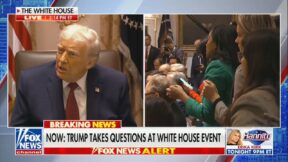Maggie Haberman Says Trump Was ‘Comparatively’ Controlled In Trial Testimony Because Judge Isn’t Messing Around
New York Times correspondent and CNN analyst Maggie Haberman said that ex-President Donald Trump was “comparatively” controlled in the defamation trial involving E. Jean Carroll — whom Trump was found liable by a New York jury for sexually abusing and defaming — because the judge is not one to mess around.
Thursday was a dramatic day in court for Trump in the trial that will decide how much money Trump will have to pay Carroll — who is seeking $10 million in damages — for defaming her while he was president.
Judge Lewis Kaplan threw a Trump spokesman out of court, scolded Trump for blurting things out loudly while his attorney was speaking, and struck much of the brief testimony Trump offered on the witness stand.
On Thursday night’s edition of CNN’s Anderson Cooper 360, Haberman gave her assessment of Trump’s relatively subdued testimony, noting the judge’s toughness may have played a role:
COOPER: Maggie, what stood out to you in court?
MAGGIE HABERMAN, CNN POLITICAL ANALYST: Well, I have a slightly different take. I think part of why Trump was so controlled comparatively speaking, as he is always pretty good at figuring out the bounds of what he can get away with, and I think he had been warned repeatedly, this is not a state court. This is not Engoron’s court. Kaplan is really no nonsense, and it’s a federal court, so to which Trump’s spokesman was thrown out of court because his phone went off at one o’clock, and the rest of us had to give up our phones. And I don’t think that that’s going to be, that person is going to be permitted back.
So I think that Trump was aware of what the parameters were, but he did still go outside what he was supposed to do. And so when Kaplan was having this discussion with Alina Habba about what Trump would say, he literally kept saying, tell me exactly what he’s going to say. And he would say, so is that really it? And are you standing by that? And Habba kept saying, that’s my understanding, as I understand it, and it’s what we hear people do with an asterisk with Trump over and over again, and he did go outside of what he was supposed to do.
[20:05:01]
So he got in the things he wanted to say in front of the jury, so I don’t think he hurt himself, but I actually think he managed to get away with a little more than it seems.
COOPER: He is expected back in court tomorrow.
HABERMAN: Yes.
COOPER: How much of this is about his feelings about this case and the importance of it? How much of it is for political reasons? Fundraising?
HABERMAN: I think it’s both. I mean, but I do think that he is — he has been incensed about this case since 2021. I mean, I’ve been hearing complaints about this for two-and-a-half years. He regretted not testifying in the initial trial that was held. He regretted that — you know, he heeded advice by everybody, not just his counsel at the time not to testify.
He is very big on control and he is very big on believing that he is his own best defender. So I think that’s a big reason. But does it have advantages? Absolutely. And these court cases have become indistinguishable from the campaign trail.
Watch above via Anderson Cooper 360.




